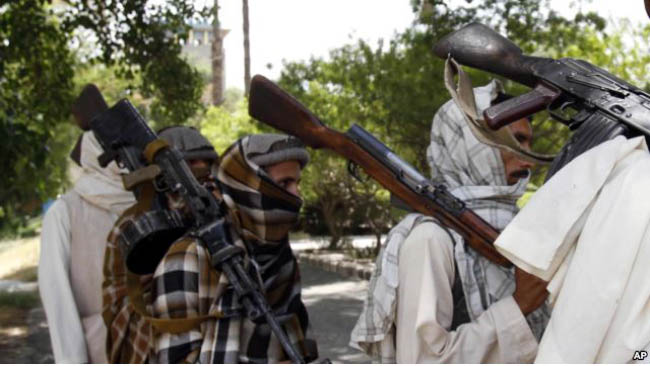At least 13 people, including nine civilians, were reportedly killed and 19 more were wounded by member of the Taliban insurgents in Kabul on the eve of the latest round of quadrilateral talks. The suicide bomber targeted Afghan police and Taliban claimed responsibility. An increase in civilian casualties demonstrates the fact that the Taliban fighters have intensified their attack since the end of NATO’s combat mission in late 2014. Moreover, the appointment of Mullah Akhtar Mansour as the Taliban’s leader led to splinter groups and created a gap among the Taliban. As a result, a number of the Taliban group pledge allegiance to Al-Baghdadi’s caliphate rather than operating under Mansour’s leadership.
Since the Taliban’s spokesman Zabihullah Mujahid claimed the responsibility via Twitter for the recent attack, it is a lukewarm response from the Taliban to peace talk. However, the fourth round of Quadrilateral Coordination Group (QCG) meeting was held in Kabul on February 23 to bring the Taliban to the negotiating table. Issuing a joint press, the four-nation group released that the first round of direct talk between the Afghan government and Taliban will take place in March. The press said, “The QCG member states invite all Taliban and other groups to participate through their authorized representatives in the first round of direct peace talks with Afghan government expected to take place by the first week of March, 2016.” It further added that the next meeting will be held in Islamabad following the first round of face-to-face talk with the Taliban elements.
Afghan government urged all warring factions to give up violence and bloodshed and join the reconciliation process. The government has frequently announced the door to peace talk is open for all insurgent groups and Afghan officials and Ulema Council have condemned spilling the blood of innocent civilians – as the Taliban fighters have perpetrated flagrantly.
“Security forces will move against those who reject peace. We will continue to pursue all possible avenues to ensure this rightful demand of our people for dignified peace that strengthens our constitutional system,” Afghan Foreign Minister Salahuddin Rabbani is quoted as saying. He hoped that the QCG meeting would reach agreement on early initiatives by Afghan and Pakistani religious scholars in support of reconciliation in Afghanistan and against terror and bloodshed. He said that the entire nation desired peace with dignity, but the elements refusing to quit the insurgency would be dealt with sternly in accordance with the law.
In the last meeting of the Quadrilateral Coordination Group (QCG), which was held in Islamabad on February 6, the participants called for direct negotiations between Afghan government and Taliban by the end of February. Most probably, the Taliban did not signal positively since the fourth meeting backtracked by saying that the direct talk will be held in March. Have the warring parties stated regarding peace talk?
It is believed that the Taliban’s heavy inroads made in recent months indicate their reluctance towards the talk. Moreover, The Taliban and the Hizb-e-Islami (HeI), the second largest resistance movement in Afghanistan, have given a negative response to the diplomatic efforts for peace negotiations before the fourth round meeting. HeI said it would take part in the intra-Afghan dialogue only if there is no foreign interference in the process, casting doubts on its participation in the four-nation effort.
It was a formal response from the movement to the peace talk offer after seeking Hekmatyar’s opinion.
Similarly, Taliban sources with the organization’s Qatar office also said they did not plan to join the talks “unless they get a positive response to their calls for certain steps ahead of the negotiations”. The Taliban want reopening of their political office in Qatar, lifting of travel curbs on their leaders, release of their prisoners and end to “propaganda in Afghanistan”. “If we join the dialogue without response to our calls, then we have serious concerns that the Islamic Emirate could face a split, as fighters in the battlefield would not accept such talks,” The Express Tribune quoted a Taliban leader. He is said to confirm that the Qatar office had been contacted and invited for the talks but “we have made it clear that it would be difficult to join the talks in such a situation”.
Despite the QCG’s urge for resuming peace talk, militancy and civilian casualties have not been mitigated and the Taliban continue their attacks in restive provinces of Afghanistan. In other words, the insurgent groups answer the government’s peace offering with the barrel of gun as ever before. So, one will conclude that the Taliban have not yet succumbed to the QCG’s urge.
In the meantime, the US President Barack Obama has proposed to “once and for all” close the military prison at Guantanamo Bay and transfer remaining detainees to a facility in the US. Speaking to reporters on Tuesday, he said, “I don’t want to pass this problem on the next president, whoever it is. Are we going to let this linger on for another 15 years?” he added. “Keeping this facility open is contrary to our values. It undermines our standing in the world. It is viewed as a stain on our broader record of upholding the highest standards of rule of law.”
This seems another generous movement towards the Taliban – perhaps to bring them to the negotiating table. The passage of time will figure out if the generous acts and pressures give the desired result, but Hamid Karzai’s extreme generosity, during his administration, did not give a positive outcome. Hence, the fruition of the QCG meeting is still under suspicion.
Home » Opinion » Will Persistent Push for Talk be Fruitful?
Will Persistent Push for Talk be Fruitful?
| Hujjatullah Zia

